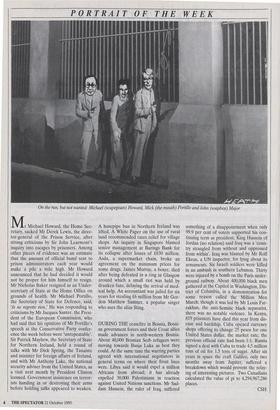PORTRAIT OF THE WEEK
On the run, but not wanted: Michael (scapegoats) Howard, Mick (the mouth) Portillo and John (soapbox) Major
Mr Michael Howard, the Home Sec- retary, sacked Mr Derek Lewis, the direc- tor-general of the Prison Service, after strong criticisms by Sir John Learmont's inquiry into escapes by prisoners. Among other pieces of evidence was an estimate that the amount of official bumf sent to prison administrators each year would make a pile a mile high. Mr Howard announced that he had decided it would not be proper for him himself to resign. Mr Nicholas Baker resigned as an Under- secretary of State at the Home Office on grounds of health. Mr Michael Portillo, the Secretary of State for Defence, said, ne regrette rien,' He was responding to criticisms by Mr Jacques Santer, the Presi- dent of the European Commission, who had said that his opinions of Mr Portillo's speech at the Conservative Party confer- ence the week before were 'unrepeatable'. Sir Patrick Mayhew, the Secretary of State for Northern Ireland, held a round of talks with Mr Dick Spring, the Tanaiste and minister for foreign affairs of Ireland, and with Mr Anthony Lake, the national security adviser from the United States, as a visit next month by President Clinton loomed. Government insistence on terror= ists handing in or destroying their arms before holding talks appeared to weaken. A hosepipe ban in Northern Ireland was lifted. A White Paper on the use of rural land recommended rates relief for village shops. An inquiry in Singapore blamed senior management at Barings Bank for its collapse after losses of £830 million. Asda, a supermarket chain, broke an agreement on the minimum prices for some drugs. James Murray, a boxer, died after being defeated in a ring in Glasgow around which a small riot was held by drunken fans, delaying the arrival of med- ical help. An accountant was jailed for six years for stealing £6 million from Mr Gor- don Matthew Sumner, a popular singer who uses the alias Sting.
DURING THE ceasefire in Bosnia, Bosni- an government forces and their Croat allies made advances in north-western Bosnia. About 40,000 Bosnian Serb refugees were moving towards Banja Luka as best they could. At the same time the warring parties agreed with international negotiators in general terms on where their front lines were. Libya said it would expel a million Africans from abroad; it has already expelled 30,000 Palestinians in reaction against United Nations sanctions. Mr Sad- dam Hussein, the ruler of Iraq, suffered something of a disappointment when only 99.9 per cent of voters supported his con- tinuing term as president; King Hussein of Jordan (no relation) said Iraq was a 'coun- try strangled from without and oppressed from within'. Iraq was blamed by Mr Rolf Ekeus, a UN inspector, for lying about its armaments. Six Israeli soldiers were killed in an ambush in southern Lebanon. Thirty were injured by a bomb on the Paris under- ground railway. About 400,000 black men gathered at the Capitol in Washington, Dis- trict of Columbia, in a demonstration for some reason called the Million Men March; though it was led by Mr Louis Far- rakhan, the anti-Semitic black separatist, there was no notable violence. In Kenya, 819 prisoners have died this year from dis- ease and hardship. Cuba opened currency shops offering to change 25 pesos for one United States dollar, the market rate; the previous official rate had been 1:1. Russia signed a deal with Cuba to trade 4.5 million tons of oil for 1.5 tons of sugar. After six years in space the craft Galileo, only two months away from Jupiter, suffered a breakdown which would prevent the relay- ing of interesting pictures. Two Canadians calculated the value of pi to 4,294,967,286 places.
CSH










































































 Previous page
Previous page